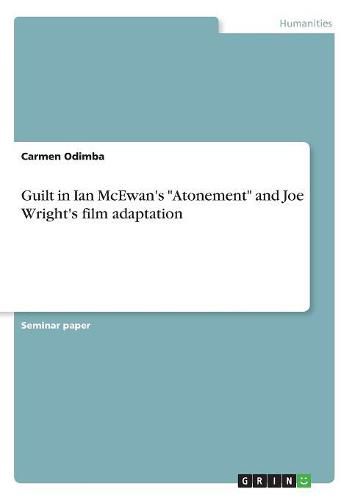Guilt in Ian McEwan's Atonement and Joe Wright's film adaptation
Carmen Odimba

Guilt in Ian McEwan’s Atonement and Joe Wright’s film adaptation
Carmen Odimba
This title is printed to order. This book may have been self-published. If so, we cannot guarantee the quality of the content. In the main most books will have gone through the editing process however some may not. We therefore suggest that you be aware of this before ordering this book. If in doubt check either the author or publisher’s details as we are unable to accept any returns unless they are faulty. Please contact us if you have any questions.
Seminar paper from the year 2009 in the subject Cultural Studies - Basics and Definitions, grade: 3,0, Johannes Gutenberg University Mainz (Department of British & Irish Studies / Translation Studies), course: Seminar: Transferring & Translating Media (Novels to Film): Ian McEwan’s Atonement, language: English, abstract: Atonement , the novel by Ian McEwan published in 2001, is qualified by many critics as a wartime love story . It is an interpretation that suits the glamorous criteria needed by the public and provided by the media nowadays. This interpretation however solely focuses on the characters of Cecilia and Robbie and forgets the important part that Briony or her writing process play in the novel and Joe Wright’s film. A complete reading of Atonement should include a study of the title and its implications in the story. We will start by analyzing the meaning of the word atonement . The choice of this title has a special significance for the whole novel and should lead us readers and spectators to understand its message - to know whether the spirit of the novel has been respected by the film maker is a question to which we will also answer briefly. The tragic event that happened in Part One of the novel could never have taken place in a more opened social environment. With other codifications, more courage and less things left unsaid, the story would have been different. We will examine some of the taboos that played an important role in the shaping of Atonement’s characters. The notion of guilt is very present in the novel, thus it will be, in relation to atonement, the central focus of this paper. We will consider the main characters, i.e. Briony, Robbie, Cecilia, Lola and Paul Marshall and try to evaluate the degree to which each one of them is guilty, feels guilty and is willing to atone for his sins. The last part of the paper will be essentially dedicated to the film, to Joe Wright’s interpretation of the concepts we named above. Co
This item is not currently in-stock. It can be ordered online and is expected to ship in 7-14 days
Our stock data is updated periodically, and availability may change throughout the day for in-demand items. Please call the relevant shop for the most current stock information. Prices are subject to change without notice.
Sign in or become a Readings Member to add this title to a wishlist.


